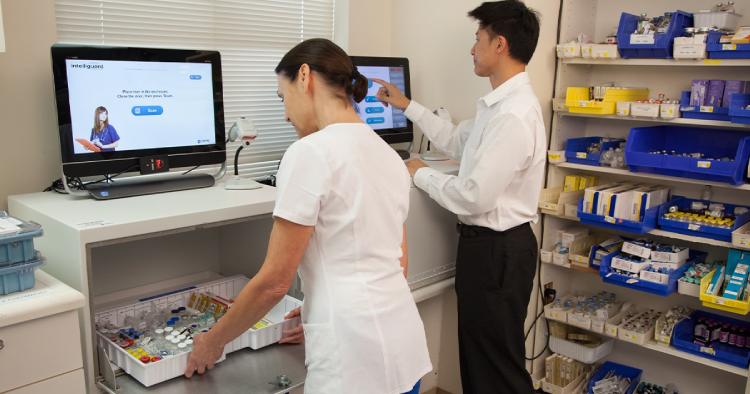For a brief period, medication imitation spread like wildfire and seriously threatened the pharmaceutical industry’s economy. Unfortunately, it also endangers the security and safety of the general people. While numerous additional measures, including new laws and regulations, have been done to decrease the threat. The decision to use Radio Frequency Identification (RFID) technology seems most comforting. As a result, we shall discuss the advantages of RFID systems in hospitals and clinical pharmacies in this article.
Table of Contents
What is RFID?
A unique form of radio technology that uses radio waves is called radio frequency identification (RFID). to recognise tags that have been attached to an object, thereby identifying it.
RFID technology plays a vital role in the healthcare sector in identifying fake medications, enhancing traceability, and minimising mix-ups and other errors frequent in hospitals and pharmacies. Yet, RFID technologies provide several advantages in clinical and hospital pharmacies.
RFID’s Potential in the Pharmaceutical Industry
Drug Tracing System
Integrated end-to-end management and control of medications from the producer and distributor is offered by a drug tracing system. to the healthcare organisations that order pharmaceuticals via a web of intermediary wholesalers. Then to the patients who eventually receive the medications.
To achieve product traceability across numerous businesses and organisations. The ability to identify individual objects using barcodes or RFID automated identification tags is necessary.
Large amounts of data may be stored on RFID-based tags, and they also allow for the addition of new data. In addition, RFID tags come in various sizes and are susceptible to metal, moisture, etc. and should therefore satisfy the requirements. Examples include the design, composition, and intended use of various medications for tracking.
Distribution Departments
The distribution divisions of drug producers and distributors had to implement control to meet the mandatory historical control requirements for physical goods. Moreover, for swiftly tracking at the unit level and attempting to develop strategies to lessen the growing administrative workload.
Drug Manufacturers
The advantages of RFID technology in hospitals and clinical pharmacies also contribute to reducing the production and distribution of fake medications. The RFID tag offers a distinctive identity that is very challenging to forge, making it easier to stop the production and distribution of counterfeit medicines.
For pharmaceutical companies, counterfeit goods might result in a loss of sales. Additionally, the availability of fake medications tarnishes the company’s reputation by giving the impression that they are unable to produce safe medicines.
Healthcare Institutions
Hospitals and pharmacies are integrating RFID-based solutions and incorporating a mechanism to verify incorrect medication dosage by comparing the RFID-tagged wristband worn by the patient with the RFID-tagged medications (when drugs are provided to patients).
Hence, a different RFID-based system that helps with drug delivery has been developed. So, it aids in avoiding errors made when assembling and mixing medications.
Hospital and Clinical Pharmacy Advantages of RFID Solutions
The pharmaceutical business can gain from integrating RFID technology into its supply chain in several ways.
The first is the medication inventory. Nonetheless, it is a challenging undertaking that requires more organisation and data than usual.
A more efficient supply chain would also save time and money.
Yet, a more compelling justification exists for patient security and safety, with a more precise method of preventing drug-related mistakes.
Businesses like AstraZeneca, which have previously included RFID, have had great success by dispensing more than 30 million Diprivan syringes with RFID technology.FDA Recommendation
The FDA has suggested that the pharmaceutical industry employ RFID technology in accordance with its laws and regulations.
Smart Packaging
Non-compliance in the pharmaceutical sector is another costly risk to patients’ health. Regarding their medications, people often struggle with confusion.
Future of RFID in Hospitals
The pharmaceutical industry’s future will be led by incorporating the advantages of RFID technologies in hospital and clinical pharmacies. Hospitals and clinics prefer tech-based solutions. Due to growing patient privacy and security concerns, medical staff prefer RFID readers or tags over password-based security systems.
Various technologies are available in this market to address the rising demand for access control and other security requirements in hospitals and clinics.
Players on the market are increasingly concentrating on providing RFID devices and solutions.
If you are interested in incorporating RFID into your company, contact us!
FAQs
Why is RFID important in healthcare?
Thanks to RFID tagging, medical staff can quickly locate every patient in the hospital. To maintain the care process and guarantee their safety. Patient tracking is vital in neonatal units, mental health centres, paediatric departments, or for tracking geriatric patients.
What are the benefits of RFID?
1. It improves organisational effectiveness.
2. It does away with human error.
3. Reducing capital expenses.
4. It makes real-time data access.
5. Providing comprehensive insights to aid in better decision-making.
Also read: Dental Team’s Organization
Also read: Virtual Reality Coach
- What are Sitewide Backlinks & Their Impact on Search Engine Ranking - May 22, 2024
- 10 Tips For How To Use Craigslist to Buy - May 5, 2024
- Best 5 ways to how to get play store back on my smartphone? - May 3, 2024


